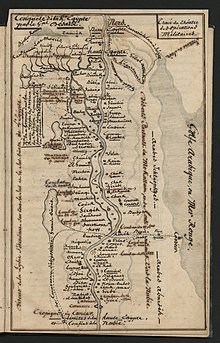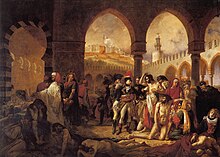French invasion of Egypt and Syria
It was the primary purpose of the Mediterranean campaign of 1798, in which the French captured Malta while being followed by the British Royal Navy, whose pursuit was hampered by a lack of scouting frigates and reliable information.On the social and technological front, the expedition's legacy includes the re-introduction of the printing press to Egypt, the founding of the Institut d'Égypte, the rise of nationalism and liberalism in the Middle East, the emergence of modern European imperialism, and the popularization of Orientalist narratives of the Muslim world.[11][12] He further wished to strengthen French trade interests over those of Great Britain in the Middle East, hoping to join forces with France's ally Tipu Sultan, ruler of Mysore in India and an opponent of British control in that country.[15] To prevent news of the impending attack on Egypt from spreading before the fleet arrived, all merchant ships that sighted the convoy during the crossing were to be seized and detained until the French had reached Alexandria[16].However, after the British were not encountered, Napoleon gave the order to stop waiting for the ships from Civitavecchia and had his fleet turn south-east, passing Mazara del Vallo and Pantelleria on 7 June.As a major chronicler of the French invasion, Jabarti decried the French invasion of Egypt as the start of:>"fierce fights and important incidents; of the momentous mishaps and appalling afflictions, of the multiplication of malice and the acceleration of affairs; of successive sufferings and turning times; of the inversion of the innate and the elimination of the established; of horrors upon horrors and contradicting conditions; of the perversion of all precepts and the onset of annihilation; of the dominance of destruction and the occurrence of occasions"[23] Menou had been the first to set out for Egypt, and was the first Frenchman to land.In two proclamations to the Egyptians and the inhabitants of Cairo, Napoleon declared that the aim of the French invasion was to liberate the country from the slavery and exploitation of the Mamluk 'clan' (race) and their autocratic beys.Their way of life and religion would be respected, and dīwāne would be established for self-government, staffed by local dignitaries[29] Dupuy's brigade pursued the routed enemy and at night entered Cairo, which had been abandoned by the beys Mourad and Ibrahim.The army then showed itself happy at this short energetic response, but the native Egyptians considered the defeat at Aboukir as fortune turning in their favour and so from then on busied themselves to find means to throw off the hateful yoke the foreigners were trying to impose on them by force and to hunt them from their country.On his orders, an immense circus was built in the largest square in Cairo, with 105 columns (each with a flag bearing the name of a département) round the edge and a colossal inscribed obelisk at the centre.On the day of the festival, Bonaparte addressed his troops, enumerating their exploits since the 1793 siege of Toulon and telling them: >From the English, famous for arts and commerce, to the hideous and fierce Bedouin, you have caught the gaze of the world.The vast and harsh desert terrain provided the Bedouin with a natural advantage, allowing them to launch hit-and-run attacks on French supply lines and communication routes.Utilizing their mobility and mastery of desert navigation, the Bedouin struck swiftly and retreated into the vast expanses, making it challenging for the French to pursue and engage them in a conventional battle.Then, accompanied by his colleagues from the Institut, Berthollet, Monge, Le Père, Dutertre, Costaz, Caffarelli, and followed by a 300-man escort, Bonaparte set out for the Red Sea and after three days' marching across the desert he and his caravan arrived at Suez.In the meantime the Ottomans in Constantinople (modern-day Istanbul) received news of the French fleet's destruction at Aboukir and believed this spelled the end for Bonaparte and his expedition, trapped in Egypt.The Ottomans planned two offensives against Cairo: from Syria, across the desert of El Salheya-Bilbeis-Al Khankah, and from Rhodes by sea landing in the Aboukir area or the port city of Damietta.He later attempted to justify this action by claiming it was a military necessity, as he had no food for so many prisoners, could not spare them an escort, and had found paroled Turks from El Arish serving in the garrison.In addition, the Royal Navy managed to muster the French flotilla transporting the ammunition and cannons[44] Without his siege guns, Napoleon had to resort to more time-consuming methods of besieging the city.Faced with heavy losses in the battles around Acre, an outbreak of plague among his soldiers and the hardships caused by the heat, Napoleon after 63 days of campaigning finally had to retreat to Egypt.To speed the retreat, Napoleon suggested the controversial step of euthanizing his own soldiers who were terminally ill with plague (between 15 and 50, sources vary) and not expected to recover through an opium overdose, to relieve their suffering, ease the retreat, prevent the spread of the disease and prevent the torture and executions the soldiers left behind would have received if captured by the enemy; his doctors refused to carry out such orders[47][48][49] but there is also evidence in the form of first-hand testimonies that claim the mass euthanasia did take place, and the matter remains one for debate.In the meantime, Mourad Bey had contacted chieftains from Jeddah and Yanbu to cross the Red Sea and to exterminate a handful of infidels who have come to destroy the religion of Mohammed.Afterwards, the Arabs of Yanbu, having rallied, came back to attack, and wanted to capture the village of Samhud, but the riflemen of the 96th Infantry Regiment assaulted them viciously and directed against them such a sustained fire, in which they were obliged to withdraw, after having lost many people.[55] However, the numerous Muslim forces were advancing, uttering frightful cries, and the Mamluks swooped down on the squares commanded by the generals, Friant and Belliard, but they were so strongly repulsed by artillery and musketry fire that they had to withdraw, leaving the battlefield strewn with their dead.Without losing time or returning to Cairo, Bonaparte ordered his generals to make all speed to meet the army commanded by the pasha of Rumelia, Saïd-Mustapha, which had joined up with the forces under Murad Bey and Ibrahim.Before leaving Giza, where he found them, Bonaparte wrote to Cairo's divan, stating: Eighty ships have dared to attack Alexandria but, beaten back by the artillery in that place, they have gone to anchor in Aboukir Bay, where they began disembarking [troops].He left Cairo in August on the pretext of a voyage in the Nile Delta without arousing suspicion, accompanied by the scholars Monge and Berthollet, the painter Denon, and generals Berthier, Murat, Lannes and a handfull of other officers including Marmont, Andréossy and Bessières.Kleber read to his troops the concise communiqué Napoleon had left: 'Only extraordinary circumstances have persuaded me, for the benefit of my country and its reputation and in obedience, to pass through the enemy lines and return to Europe.The Anglo-Ottomans then commenced their land offensive, the French were defeated by the British in the Battle of Alexandria on March 21, surrendered at Fort Julien in April and then Cairo fell in June.This deployment of intellectual resources is considered as an indication of Napoleon's devotion to the principles of the Enlightenment, and by others as a masterstroke of propaganda obfuscating the true motives of the invasion: the increase of Bonaparte's power.Several months after the revolt of Cairo in 1798, inventor Nicolas-Jacques Conté and mathematician Gaspard Monge built a hot air balloon from paper, coloured with the tricolour red, white and blue of the French Republic.



















Franco-Ottoman WarSuez CrisisWar of the Second Coalitionthe Pyramidsthe NileAbukir (1799)Abukir (1801)Alexandria (1801)Eyalet of EgyptFranco-Ottoman allianceOttoman EmpireMamluksBedouin tribesmenAlbanian bashi-bazouksGreat BritainUnited KingdomKingdom of FranceRegency of AlgiersFrench RepublicArmée d'OrientSelim IIIYusuf PashaMustafa PashaMuhammad Ali PashaJezzar PashaAbdullah PashaMurad BeyIbrahim BeyAbdallah BeyHaim FarhiRalph AbercrombyGordon DrummondSamuel GrahamJohn MooreGeorge RamsayJohn Hely-HutchinsonWilliam BeresfordSidney SmithHoratio NelsonAntoine de PhélippeauxRaïs HamidouNapoleon BonaparteJean KléberThomas DumasJacques MenouJean LannesLouis DesaixJoachim MuratLouis-Nicolas DavoutJean RappRené SavaryJean-Antoine VerdierJean ReynierLouis André BonJean-Baptiste BessièresCousin de DommartinMaximilian CaffarelliJean-Baptiste PerréeCharles DuguaMartin DupuyBrueys d'AigalliersPierre-Charles VilleneuveHorace SébastianiCharles-Louis LasalleRose de BeauharnaisLouis BonaparteGéraud DurocJoseph SulkowskiLouis FriantJean-Andoche Junot1st AlexandriaShubra KhitPyramids1st Cairo1st El ArishMount Tabor1st Aboukir2nd El ArishHeliopolis2nd AboukirMandora2nd AlexandriaFort JulienEl RahmaniyaAl Khankah2nd Cairo3rd AlexandriaCapitulationHistory of EgyptPrehistoric EgyptAncient EgyptEarly Dynastic PeriodOld Kingdom1st Intermediate PeriodMiddle Kingdom2nd Intermediate PeriodNew Kingdom3rd Intermediate PeriodLate PeriodArgead dynastyPtolemaic dynastiesRoman and Byzantine EgyptSasanian EgyptMedieval EgyptRashidun caliphateUmayyad caliphateAbbasid dynastyTulunid dynastyIkhshidid dynastyFatimid dynastyAyyubid dynastyMamluk dynastyEarly modernOttoman EgyptFrench occupationMuhammad Ali dynastyKhedivate of EgyptLate Modern EgyptBritish occupationSultanate of EgyptKingdom of EgyptRepublicOttomanFrenchNapoleonFrench Revolutionary Wars

